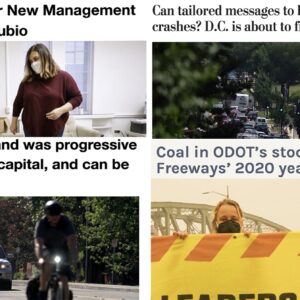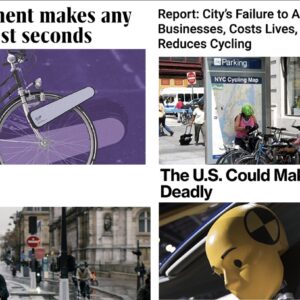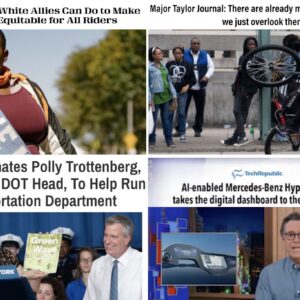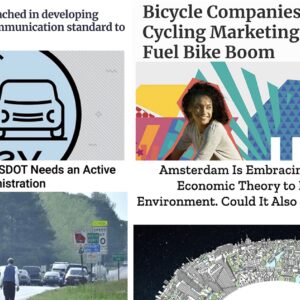Cheap car floodgates open; Republicans who ride; Cheap bikes from China; True nature of our road system revealed.
Good thing it’s sunny out. Here’s the news:
– India’s Tata Nano — the small, super affordable “people’s car” — has hit the streets and the showrooms.
– The US highway and trucking lobby has asked the federal government to make an “Eisenhower-like commitment” to new investment in the nation’s highway system.
– Meanwhile, U.S. Rep. Peter DeFazio (Democrat from the Eugene Area) as chairman of the house subcommittee on highways and transportation could be well-positioned to implement a new kind of vision. But, he tells Jeff Mapes over a beer, “there’s no advocate for transportation” in the Obama administration.
– The bicycle industry continues to prove it isn’t entirely immune to the downturn. Cannondale plans to lay off 200 workers in a Pennsylvania plant.
– Meanwhile, industry leaders and advocates are speaking out against stipulations in a new consumer protection bill that would take many kids’ bikes off the market due to levels of lead in some of their parts. Many of these bikes are given free to needy kids.
– In other bike industry news, Portland’s own Vanilla Bicycles was featured, lustily in Forbes Magazine.
– The woes of the auto industry continue to grow.
– WorldChanging reflects on Oregon’s 2006 mileage tax pilot program.
– Bicycling has always cut across party lines, points out the Utne Reader, pointing out that it isn’t only Green Party members out there riding bikes.
– Don’t pigeonhole celebrity basketball players either. The Phoenix Suns’ Louis Amundson loves his bike. So much.
– And finally last week, Project for Public Spaces finally revealed what we really knew all along — the US transportation system is actually a giant Ponzi scheme. “Roads are being built to nowhere, causing the need to build more roads…”
As always, add your own news, links, commentary, and calls to arms in the comments.





Not too excited for India re: the Nano. I think Wired Magazine stated the situation pretty well last June in their article, “India’s 50-MPG Tata Nano: Auto Solution or Pollution?”
Trek has also had lay-offs.
Ok, you know the Project for Public Spaces article is an April Fool’s joke, right? I mean, it’s funny, but you’re about five days late…
There were a bunch of jokey April 1 posts on the transpo blogs…that one was the best. Rounded up for your reading pleasure.
The article linked in the bit about the “…new consumer protection bill that would take many kids’ bikes off the market…” was interesting but raises questions it doesn’t provide answers for. There certainly seems to have been substantial effort directed towards having legislators amend this bill…involvement by both citizen advocates and industry lobbyists at a rally at the hill.
It mentions that lead containing parts in some affected kids bikes are small, but doesn’t explain why obliging manufacturers to use safer parts in production might lead manufacturers to stop production or distributors to continue bringing such bikes into the U.S.. Would replacing those parts during manufacture, with parts that don’t have lead make manufacture or distribution in this country impractical or cost prohibitive?
Interesting point that, according to this article, the product that most stands to be affected by this bill:
“That last group potentially has the most to lose as big name suppliers have already stopped manufacturing youth motorcycles and ATVs and have pulled existing inventory from retailers’ shelves.”
Fewer of those types of vehicles would be a good thing…wouldn’t it? With more help like that, sanity might return again someday to Sand Lake.
The trucking industry has been hit hard by disastrously implemented regulations in the last several years, fuel prices, increasing maintenance costs due to putting off purchases of lower polluting equipment, looming costs because they’ve been scrapping their fleet in an effort to stay “lean” and when things rebound they won’t have the equipment available to respond, drivers are finding other jobs, so they won’t have the staff available either, etc.
I don’t see how freeways will fix that.
Eisenhower-like commitment? With what money??
What will “fix” the trucking industry is to encourage, by pricing and safety regulation, intermodal use of the rail depots in every metro.
There is no NEED for long haul trucking. It requires more fuel, in engine running at rest stops and over all inefficiency of ton-mileage, and safety in that economic incentives still favor the long haul trucker that gets their load there the quickest. This means that drivers have incentive to avoid mandated rest time and this necessitates more regulation and enforcement.
The Trucking Industry has known, since at least 1997, that in long haul trucking, and thus the NEED for large interstate highways, is on the way out. Fuel price was the reasoning: diesel will cost too much. It turns out that roads themselves cost more to build.
If the trucking industry, state and federal DOTs can be convinced that it is fiscally conservative to reduce road wear and congestion by shifting cargo to our national rail network then perhaps they will change their tune. Certainly this will entail a large investment in rail. Single track will probably need to be upgraded to double track in large corridors. The bridges will expensive but most land rail has plenty of room for expansion real estate wise. Rail yards will have to be upgrade and most likely expanded. This degree of expansion should be less per ton that what would be required to support equivalent “road-only” modes. Maybe we can put Cisco Systems in charge of an effort to bring the 19th century train car switching technology into the 21st century. Are all data packet switching techniques applicable to rail car switching? No, however, it is a loss to assume that the rail industry is also not in dire need of efficiency upgrades.
As long as we seem destine to spend money that comes from the future we should do so in a manner that gives the best return and demands the least continual maintenance costs.
The trucking industry doesn’t need more roads, and they know it. Drive on the interstate across North Dakota once in your life. It is pretty empty, although it is all 4 lanes wide. When they want to repave it, they divert the traffic over to the other side for couple miles at a time, (and repaint the other side to have a double yellow line down the middle,) and then take months to actually do the repaving. And it has no effect on congestion/travel speed/etc, there just isn’t enough traffic. Even look at I-5 at the California border, it is only two lanes in each direction, and the traffic on it would fit on 1 lane in each direction as long as they could pass occasionally.
Old economy (Forbes) meet new economy (Vanilla Bicycles), awesome!